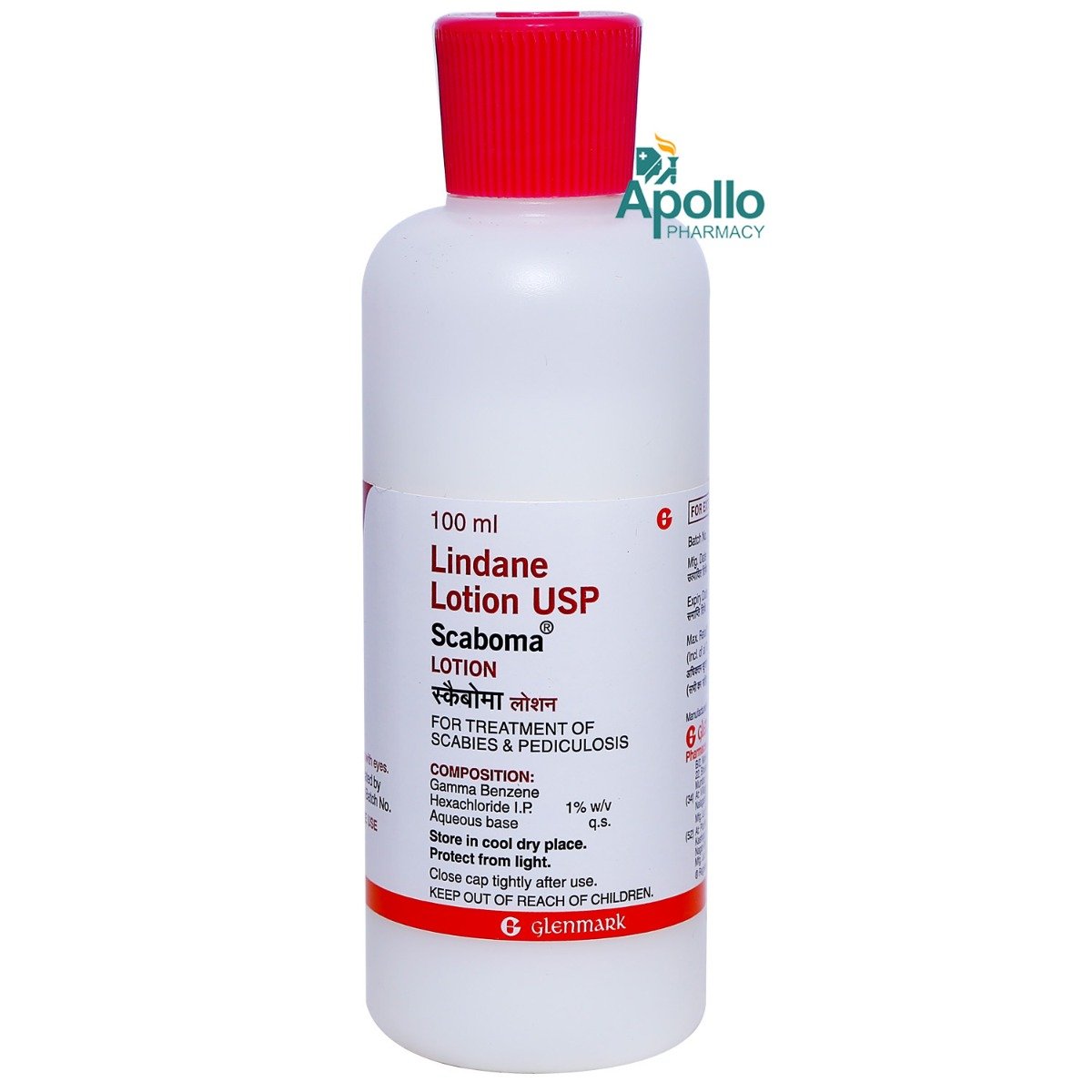Lindane
About Lindane
Lindane belongs to a class of antiparasitic drugs known as 'scabicides' (kills scabies mites) and pediculicides (kills lice). Lindane primarily treats scabies in people for whom other medicines did not work. Lindane is available usually in the topical form used to treat head lice. Scabies is a skin condition caused by mites known as Sarcoptes scabiei. It causes an itchy skin rash and is contagious (spreads from one person to another person).
Lindane contains Lindane which works by killing scabies mites and their eggs by penetrating through the skin. Lindane is used to kill mites but does not prevent scabies or recurring symptoms.
Lindane is only for external use. Do not put Lindane in your mouth. In case of accentual swallowing or contact with the mouth, contact the poison control center immediately as it may be poisonous if taken by mouth. Apply a very thin layer of Lindane on the skin from the neck down. Apply Lindane with a toothbrush under fingernails as scabies mites likely stay there and throw away that toothbrush. Some people may experience skin dry skin, skin rash, itching, or burning sensation of the skin. Most of these side effects of Lindane do not require medical attention and gradually resolve over time. However, if the side effects persist, please consult your doctor.
If you are known to be allergic to Lindane or any other medicines, please tell your doctor. If you are pregnant or a nursing mother, it is advised to consult a doctor before using Lindane. Do not apply Lindane on lots of broken skin, crusted (scabby), or open sores on the skin. You should wash Lindane from the body thoroughly after 8-12 hours using warm water as leaving it on the skin for a prolonged time may lead to fits and death. Lindane should not be used to treat premature babies and people who have had any seizure episodes (fits). Lindane may be absorbed by the whole body and cause central nervous system toxicity resulting in disorientation, dizziness, and fits. Inform your doctor if you have AIDS/HIV or liver cirrhosis, alcoholism, history of head injury, or spinal cord or brain tumor before taking Lindane.
Uses of Lindane
Medicinal Benefits
Lindane is an antiparasitic drug used to treat scabies and lice. Lindane kills scabies mites and their eggs by going through the skin. Lindane in shampoo form is used to treat head lice. Lindane is used to treat scabies in patients for whom other medicines did not work or cannot be given other safer medicines.
Directions for Use
Storage
Side Effects of Lindane
- Dry skin
- Skin rash
- Itching
- Burning sensation of skin
Drug Warnings
Do not use Lindane in premature infants due to increased risk of skin permeability. If you have uncontrolled fits, inform your doctor before using Lindane as it may be absorbed by the whole body and cause central nervous system toxicity resulting in disorientation, dizziness and fits. You are advised to wash Lindane from the body completely after 8-12 hours using warm water as leaving it on the skin for a prolonged time may lead to fits and death. There may be skin itching for a few weeks even after using Lindane. However, if itching worsens, please consult a doctor. If you are pregnant or breastfeeding, please contact a doctor before taking Lindane. Do not use Lindane to treat the second attack of scabies that comes immediately after the first episode as using it more than one time can lead to fits and death. Inform your doctor if you have HIV/AIDS, liver cirrhosis, excessive consumption of alcohol, history of head injury, spinal cord or brain tumour before taking Lindane.
Drug Interactions
Drug-Drug Interaction: Lindane may interact with antipsychotics (haloperidol)
Drug-Food Interaction: No interactions found.
Drug-Disease Interaction: Do not use Lindane in patients with uncontrolled seizures (fits) disorder as it may cause central nervous system toxicity and inform your doctor if you have liver cirrhosis, eczema, psoriasis, or crusted scabies.
Drug-Drug Interactions Checker List:
Safety Advice

Alcohol
cautionInteraction of alcohol with Lindane is unknown. Please consult a doctor before consuming alcohol while using Lindane.

Pregnancy
unsafeLindane is Category C pregnancy drug and is considered unsafe for pregnant women due to the increased risk of adverse effects.

Breast Feeding
unsafeLindane is not recommended for breastfeeding mothers as it may be excreted in breast milk and cause adverse effects in the baby.

Driving
safe if prescribedLindane usually does not affect your ability to drive or operate machinery.

Liver
cautionIf you have any concerns regarding the use of Lindane in patients with liver problems, please consult a doctor.

Kidney
safe if prescribedIf you have any concerns regarding the use of Lindane in patients with kidney problems, please consult a doctor.

Children
cautionPlease consult a child specialist before using Lindane in children.
Habit Forming
Diet & Lifestyle Advise
- Avoid hot showers or hot water to bathe to prevent worsening of the condition.
- Wash the used clothes and bedsheets in hot water or dry clean them.
- Avoid sharing of clothes, towels, or bedding with others as it may increase the risk of transmission.
- Do not have close physical contact or sex until the treatment is completed.
Special Advise
- Avoid contact of Lindane with eyes. In case of accidental contact, rinse with water.
- Do not apply Lindane on lots of broken skin, crusted (scabby), or open sores on the skin.
- Wear gloves that are least permeable to Lindane such as sheer vinyl, nitrile, or latex with neoprene to avoid Lindane getting on hands while applying to someone else. Avoid natural latex gloves as they are more permeable to Lindane and wash your hands thoroughly after application.
- Wash all recently worn pajamas, underwear, clothing, towels, sheets, and pillowcases in very hot water or dry clean them.
- Do not cover the treated area with unbreathable things like tight or plastic clothes, plastic lining, blankets, or diapers.
- Avoid contact with other people’s skin after applying Lindane especially do not touch a baby or small child.
- Avoid using any oil on hair or skin just before or after applying Lindane as oils may increase the absorption of Lindane and cause adverse effects. Oils include moisturizers, skin lotions, oil-based conditioners, and hair products.
Patients Concern
Disease/Condition Glossary
Scabies: It is a skin condition caused by mites known as Sarcoptes scabiei. It causes an itchy skin rash and is contagious (spreads from one person to another person). These tiny mites crawl under the skin and live on the skin for months laying eggs, and causing severe itching. Scabies spreads easily throughout the body except for the head. Hence, it should be treated quickly. The most commonly seen symptom include an intensely itchy rash that worsens at night. People who live in nursing homes, university halls of residence, or who work in nurseries are at more risk of spreading scabies from person to person due to close contact.
FAQs
No, Lindane is not recommended for patients with uncontrolled fits as it may increase the risk of fits. Therefore, inform your doctor if you are suffering from fits or have a history of fits before using Lindane.
No, Lindane should not be applied immediately after bathing as warm or wet skin helps Lindane to penetrate through the skin quickly and may increase the risk of fits. Therefore, you are advised to wait for minimum 1 hour after taking a shower or bath.
No, Lindane does not prevent scabies or reinfestation (recurring scabies). Lindane kills the mites and is only used in the treatment of scabies that has already started.
You are not recommended to use more than the prescribed dose of Lindane or too often as it may lead to life threatening seizures (fits).
No, you are recommended to avoid breast-feeding for 24 hours after using Lindane and also throw away any milk collected using breast pump within 24 hours of using Lindane due to increased risk of toxic effects. However, please consult a doctor if you are a breast-feeding mother or pregnant before using Lindane.
Yes, scabies is a contagious skin condition which spreads from one person to another through physical contact. Therefore, it is recommended to avoid close physical contact until the treatment for scabies is completed.






